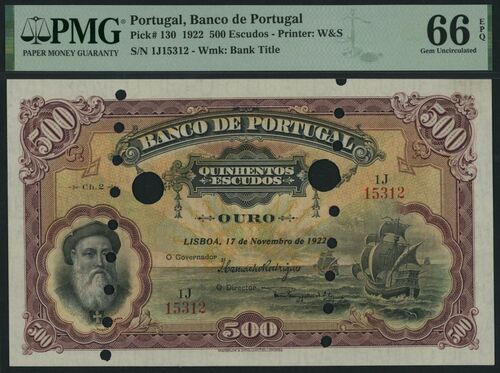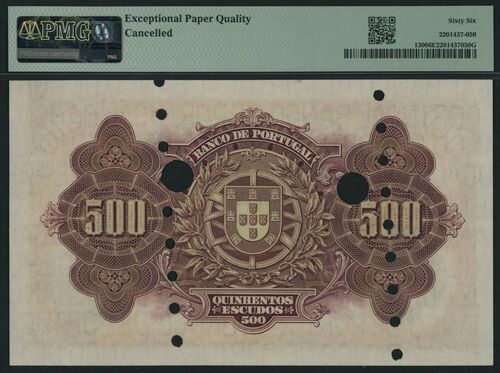Auction: 24009 - World Banknotes
Lot: 380
(x) Banco de Portugal, [Top Pop] 500 Escudos, Ch.2, 17th November 1922, serial number 1J 15312,
An Extraordinary Alves dos Reis banknote,
Artur Virgílio Alves dos Reis, was the Greatest Swindler in Portuguese History. Born in Lisbon on September 8, 1896, is a name that resonates deeply in the financial history of Portugal, remembered as the architect of one of the most daring and complex scams of the 20th century. Alves dos Reis's life is a fascinating tale of ambition, cunning, and audacity, culminating in a fraud that shook the Portuguese economy and had lasting political consequences.
Born into a modest family, Alves dos Reis showed from a young age a keen mind for business and a remarkable ability to deceive. He attended the School of Engineering in Lisbon but did not complete his studies. Determined to achieve success, he forged an engineering degree from the prestigious University of Oxford. This forgery was the first step in a series of frauds that would make him infamous.
In the 1920s, Alves dos Reis began to build his fraudulent career in Angola. Using his forged degree, he secured an important position at the Companhia de Caminhos de Ferro de Angola. With cunning and accounting manipulations, he embezzled significant funds from the company. This scheme earned him a considerable fortune and allowed him to perfect his skills in financial fraud. Additionally, he forged stock certificates and manipulated documents to appropriate resources from investors.
The pinnacle of Alves dos Reis's criminal career was the audacious scam against the Banco de Portugal in 1925. Using forged documents, he convinced the renowned British note-printing firm Waterlow and Sons to print 200,000 500-escudo notes, under the pretext of financing a development project in Angola. Reis created the fictitious "Companhia de Moçambique e Angola" as a front for the scam, drafting an apparently legitimate contract with forged signatures of senior Banco de Portugal officials. With this, he managed to have Waterlow and Sons print the notes, which were indistinguishable from the real ones.
The fraud was executed so perfectly that Alves dos Reis managed to put the notes into circulation without immediate suspicion. He used the money to acquire stakes in companies, banks, and properties, trying to legitimise his newly acquired wealth. At one point, he controlled several financial institutions, including the Banco Angola e Metrópole, through which he planned to create a financial monopoly.
Moreover, Alves dos Reis and his accomplices opened accounts in foreign banks, facilitating the transfer and laundering of money. They purchased real estate, businesses, and even shares in Banco de Portugal, attempting to influence the institution from within. The magnitude of the scam was such that, for a brief period, Alves dos Reis was seen as an influential businessman and respected philanthropist.
The discovery of the scam began when Banco de Portugal noticed an anomalous increase in the number of 500-escudo notes in circulation. A detailed investigation revealed the monumental fraud. In December 1925, the Portuguese authorities, shocked by the scheme's magnitude, launched a search for Alves dos Reis and his accomplices.
The complexity of the fraud and Alves dos Reis's sophisticated methods made the investigation particularly challenging. However, through meticulous analysis of documents and transactions, the authorities managed to unravel the scheme. In January 1926, Reis was arrested and brought to trial. The investigation revealed impressive details about how he had managed to deceive one of the world's most respected printing firms and the Portuguese bankers themselves. The fraud was equivalent to approximately 1% of Portugal's GDP at the time, causing a profound impact on the country's economy.
During the trial, Alves dos Reis tried to defend himself by claiming that his actions were part of a plan to stabilise the economy of Angola and Portugal. However, the vast evidence of forgeries and financial manipulations led to his conviction. He was sentenced to 20 years in prison, of which he served 15. The Alves dos Reis fraud had lasting repercussions on the Portuguese economy and politics. It contributed to the financial and political instability that culminated in the May 28, 1926 coup, leading to the military dictatorship and eventually the Estado Novo regime.
Banco de Portugal profoundly reformed its security processes to prevent similar frauds in the future. Alves dos Reis's story serves as an enduring reminder of the dangers of unchecked ambition and the need for rigor and integrity in the financial system. His ability to manipulate and forge documents became a case study in financial fraud, influencing reforms in banking and currency printing systems worldwide.
Artur Alves dos Reis remains a fascinating and infamous figure in Portuguese history. His story is a tale of cunning and audacity, where unchecked ambition led to one of the greatest financial frauds of all time. Today, he is remembered not only as a swindler but also as an example of human ingenuity – and the risks when that ingenuity is used for ill.
(Pick 130x), in PMG holder 66 EPQ Gem Uncirculated, cancelled
Subject to 5% tax on Hammer Price in addition to 20% VAT on Buyer’s Premium.
Sold for
£1,800







